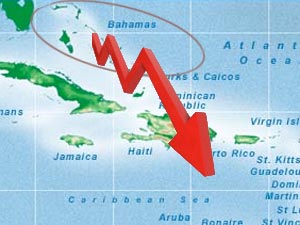
An international rating agency is urging the Bahamian government to take immediate action or potentially suffer more downgrades to the economy.
Edward Al-Hussainy, assistant vice president and analyst at Moody’s, said the country’s most recent downgrade from A3 to Baa1 is not entirely the fault of the Progressive Liberal Party (PLP). However, he insisted that the Christie administration must take more tangible measures to bolster revenue streams and reign in expenditure.
“It hasn’t really been this particular government. It has been a gradual decline over the last few years, a slow and gradual deterioration,” he told Guardian Business from Moscow, Russia. “What we are looking for is a strategy to arrest that. The thinking behind the downgrade is we don’t see that coming soon enough.”
Last night’s downgrade, the second from the rating agency in as many years, also comes with the caveat that The Bahamas still retains its negative outlook.
In other words, Al-Hussainy said that the economy is at risk of further downgrades if the government fails to implement meaningful changes.
“Things are starting to slip, and if it continues, that may result in another downgrade looking forward,” he revealed. “That might put the rating at risk again. This is a signal we send out to the market. It doesn’t look very bright at the moment.”
Al-Hussainy was quick to add, however, that rating is still “good” within a Caribbean context. Baa1 puts the country on par with countries such as Mexico and Brazil, both of which have shown considerable promise in recent years and boast growing economies.
He told Guardian Business that tax reform is key to recovery.
At the end of the day, he explained that there are generally two solutions to the problem. One is eventually “growing” out of the problem. Given the nature of the world economy, “that is not something we are going to see in The Bahamas”.
The other way is to reduce spending and institute “pretty substantial tax reform”, whether that be a value-added tax, reforming property tax or even bringing in income tax.
In a statement late last night, the government said it plans to lay out a clear, detailed action plan during the mid-year budget process.
The ultimate objective of the strategy is to gradually move the debt-to-GDP ratio back towards acceptable levels and ultimately achieve a primary budget surplus, the statement read.
Limited growth prospects, significant deterioration of the government’s balance sheet, low revenue base and rising levels of debt were all listed as reasons for the most recent downgrade.
Winston Rolle, the CEO of the Bahamas Chamber of Commerce and Employers Confederation (BCCEC), expressed concern on the administration’s ability to implement meaningful reform.
A downgrade from Moody’s ultimately means a higher cost of borrowing, he noted, which could be necessary to right the course of the economy.
He echoed Moody’s analysis that a clear and achievable strategy must be put in place immediately.
“I think any opposition government, when they are looking to become the government, should have a strategy. By now it should be displayed and take effect,” he said. “It’s time to focus on how to move forward, rather than what happened in the past. Living in the past is a cardinal sin. We need to understand those mistakes but move forward.”
Rolle added that this downgrade will have an impact on how business operates, in terms of whether it can expand and employ more Bahamians. It will also likely hurt foreign direct investment.
Jeffrey Todd
The Nassau Guardian



